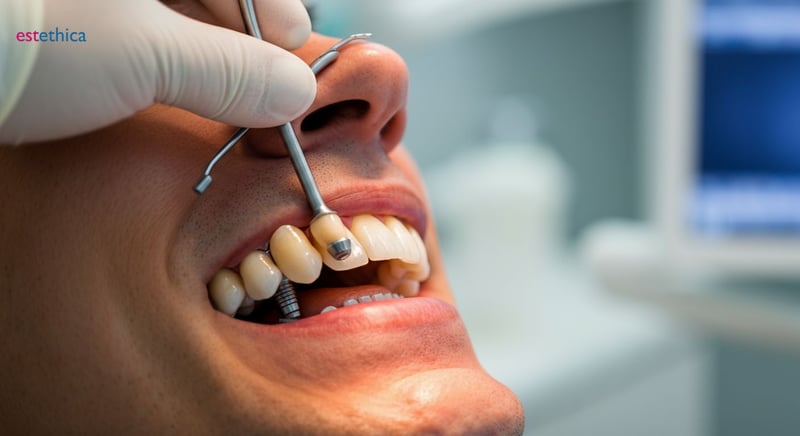Unlocking the Secrets of Dental Implants: A Comprehensive Guide
Learn everything you need to know about dental implants, from procedure to care.
Dental implants are a revolutionary solution for individuals experiencing tooth loss or damage. By offering a permanent and natural-looking alternative, dental implants have transformed modern dentistry, enabling patients to reclaim their smile with confidence. In this comprehensive guide, we explore the essential aspects of dental implants, from understanding what they are and the procedure involved, to the latest innovations and tips for their care.
What Are Dental Implants and How Do They Work?
Understanding the Structure and Function of Dental Implants
Dental implants are innovative solutions for tooth replacement, designed to replicate the look and feel of natural teeth. They consist of a titanium screw, which is surgically placed into the jawbone, serving as a sturdy root for the prosthetic tooth. This integration not only enhances the aesthetic appeal of a complete smile but also restores essential functions such as chewing and speaking.
Key Benefits of Dental Implants
- Durability: Dental implants are known for their long-lasting nature, often enduring for decades with proper care.
- Bone Health: They help maintain jawbone density, preventing bone loss that typically follows tooth loss.
- Natural Appearance: Implants closely mimic the appearance of natural teeth, providing a seamless look.
These benefits make dental implants a preferred choice for many seeking permanent tooth replacement solutions.
The Implant Procedure: Step by Step
- Consultation: The process begins with a thorough evaluation by a dental professional to assess suitability.
- Surgical Placement: The titanium screw is surgically inserted into the jawbone, where it will fuse over time.
- Prosthetic Attachment: Once healed, a custom-made prosthetic tooth is attached, completing the restoration.
This step-by-step approach ensures that the implant is securely integrated and functions effectively as a natural tooth replacement.

Step-by-Step Overview of the Implant Procedure
Comprehensive Evaluation and Planning
The journey to a successful dental implant begins with a comprehensive evaluation. This step involves detailed imaging and assessment of the jawbone structure to ensure it can support an implant. Dentists also consider the patient's overall oral health and any underlying conditions that might affect the procedure. For instance, a patient with gum disease may require treatment before proceeding with the implant surgery. This thorough planning phase is crucial for tailoring the procedure to each individual's needs, ensuring optimal outcomes.
Healing and Integration Process
After the implant surgery, the healing phase is critical. During this period, the implant undergoes osseointegration, where it fuses with the jawbone. This process can take several months, depending on the individual's healing capacity. Patients are advised to follow specific care instructions to promote healing and prevent complications. For example, maintaining oral hygiene and avoiding hard foods can significantly aid recovery. This phase is essential for establishing a strong foundation for the prosthetic tooth.
Factors Influencing Implant Success
- Bone Density: Adequate jawbone density is crucial for supporting the implant securely.
- Oral Hygiene: Consistent oral care practices help prevent infections that could jeopardize the implant.
- Overall Health: Conditions like diabetes can affect healing and integration, requiring careful management.
Understanding these factors helps patients and dentists work together to maximize the success of the implant procedure.
Final Restoration and Follow-Up
- Custom Crown Placement: Once the implant is fully integrated, a custom-made crown is attached.
- Functionality Testing: The dentist ensures the crown fits well and functions like a natural tooth.
- Regular Check-Ups: Ongoing dental visits are essential to monitor the implant's health and address any issues.
This final stage completes the restoration, providing patients with a durable and aesthetically pleasing tooth replacement. Regular follow-ups ensure the longevity and functionality of the dental implant.

Caring for Your Dental Implants: Essential Tips
Daily Oral Hygiene Practices for Implants
Maintaining dental implants requires diligent oral hygiene. Regular brushing with a soft-bristle toothbrush helps remove plaque without damaging the implant surface. Flossing is equally important, as it reaches areas between the implant and adjacent teeth, preventing plaque accumulation. Using an antimicrobial mouthwash can further reduce bacteria, promoting a healthy oral environment.
Professional Care and Monitoring
Routine dental check-ups are vital for the longevity of dental implants. Dentists can identify early signs of complications, such as peri-implantitis, a condition similar to gum disease that affects implants. Regular professional cleanings help maintain implant health by removing tartar that home care might miss. These visits also allow dentists to assess the implant's integration and functionality.
Key Habits for Implant Longevity
- Avoiding hard foods: Chewing hard items like ice can damage the implant or surrounding teeth.
- Quitting smoking: Smoking can impede healing and increase the risk of implant failure.
- Managing health conditions: Conditions like diabetes should be well-controlled to support implant health.
Adopting these habits can significantly enhance the lifespan of dental implants, ensuring they remain a reliable tooth replacement solution.
Steps to Address Implant Issues
- Identify symptoms: Look for signs like swelling or discomfort around the implant.
- Consult your dentist: Seek professional advice promptly to address any concerns.
- Follow treatment plans: Adhere to prescribed treatments or adjustments to resolve issues.
Timely intervention and adherence to professional guidance can prevent minor issues from escalating, ensuring the continued success of dental implants.

Exploring the Latest Innovations in Implant Technology
Advancements in Digital Implant Placement
Recent advancements in dental technology have significantly enhanced the precision of implant surgery. Digital tools, such as 3D imaging and computer-aided design, allow dentists to plan and execute implant placements with remarkable accuracy. This technology minimizes the risk of complications and ensures optimal alignment with the patient's natural bite. For example, a dentist can use a digital scan to create a virtual model of the patient's mouth, allowing for precise planning of the implant's position. This approach not only improves the surgical outcome but also reduces recovery time, as the procedure is less invasive.
Innovative Materials for Enhanced Biocompatibility
The development of new materials has been pivotal in advancing dental implant technology. Modern implants are crafted from highly biocompatible materials that integrate seamlessly with the jawbone, reducing the risk of rejection. For instance, zirconia implants offer an alternative to traditional titanium, providing a metal-free option that is both durable and aesthetically pleasing. These materials are designed to mimic the natural properties of bone, promoting faster healing and long-term stability. Additionally, surface modifications, such as nano-coatings, enhance the implant's ability to bond with the bone, further improving success rates.
Key Features of Modern Implant Technology
- Precision: Digital tools ensure accurate placement, enhancing surgical outcomes.
- Biocompatibility: Advanced materials promote seamless integration with the jawbone.
- Aesthetics: Innovations in design offer natural-looking results that blend with existing teeth.
These features highlight the transformative impact of technology on dental implants, offering patients improved functionality and appearance.
Steps in Implementing New Implant Technologies
- Assessment: Evaluate the patient's needs and suitability for advanced implant options.
- Planning: Utilize digital tools to design a precise surgical plan tailored to the individual.
- Execution: Implement the plan using innovative materials and techniques for optimal results.
This structured approach ensures that patients benefit from the latest advancements in implant technology, achieving superior outcomes and satisfaction.
Innovative Digital Implant Placement Techniques
Comprehensive Care and Long-Term Implant Success
Frequently Asked Questions
What are dental implants and how do they work?
What is the step-by-step procedure for getting a dental implant?
How should I care for my dental implants to ensure their longevity?
What are the latest innovations in dental implant technology?
What factors influence the success of a dental implant?
Discover the path to your healthiest and most beautiful self with estethica's award-winning services. Call now for a free consultation and let our expert team guide you on your journey to wellness and aesthetic excellence.
📞 Call for Your Free Consultation Today!